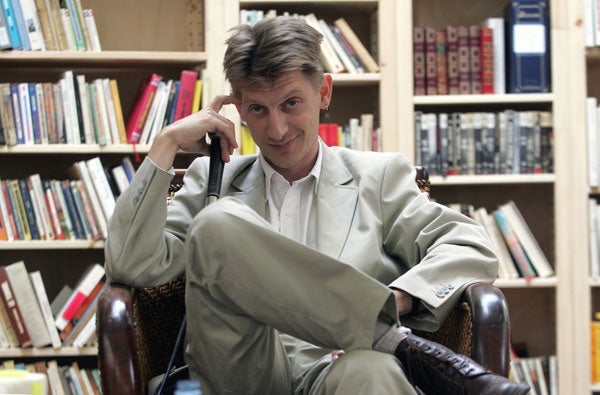Boyd Tonkin: Stay in the bedroom, you literary chaps
The Week In Books

Does public scorn and ridicule deter future crimes? That principle of penology undergirds the Bad Sex Prize, mounted annually with such vim and vigour by the Literary Review. Presiding over this year's ceremonial pillory on Monday evening, Alexander Waugh made the thrust of the award plainer than ever. It aims not to thrash the blatant bonkbuster but to halt otherwise good writers at the bedroom door and so, like some mental chastity belt, forestall all future acts of fictional sex. Just say no, says Waugh.
This time, passages from novels by Philip Roth, Amos Oz, Nick Cave, Richard Milward and John Banville all found themselves in the figurative stocks. The prize, however, went to Jonathan Littell and his much-garlanded wartime epic, The Kindly Ones.
In Charlotte Mandell's translation from the French (and surely she should share the bouquets and brickbats?), Littell's incorrigible anti-hero of an SS officer comes across all Homeric at a climactic moment: "This sex was watching at me, spying on me, like a Gorgon's head, like a motionless Cyclops whose single eye never blinks. Little by little this silent gaze penetrated me to the marrow. My breath sped up and I stretched out my hand to hide it: I no longer saw it, but it still saw me and stripped me bare (whereas I was already naked). If only I could still get hard, I thought, I could use my prick like a stake hardened in the fire, and blind this Polyphemus who made me Nobody...." Und so weiter.
So aptly held at the "In and Out" Club in St James's, the party is always a treat. Only the most precious of critics could fret about the justified mockery of overblown prose. Yet once more I felt rather like (to use a Waugh family analogy) a pagan at High Mass. It strikes me that, in Britain above all, many male literary novelists should be writing more, and better, about sex. Instead, a certain rueful inoffensive blandness – you might call it the Hornby gauge – seems to have taken hold.
It becomes the default position for sensitive types way too anxious about exposing themselves to charges of machismo or – heaven forfend - "misogyny". How spineless, though, to tiptoe self-righteously around the pool rather than take the risk of a dip.
This is sheer funk, chaps, and simply will not do. In effect, for serious male novelists to slam the bedroom door - as the Bad Sex crew demand - would leave all the heavy literary lifting about the erotic life to women authors. And they have had to shoulder that burden for too long anyway. Although the op-ed pundits fudged this point, one strong sign of the authenticity of the research scientist formerly known as "Belle de Jour" was a comradely compassion about the foibles of masculine desire. This far outstripped in insight much of what passes for intimate analysis in male-written "literary fiction".
Between tacky raunch one the one hand and fastidious refinement on the other, a vast terrain of possibilities lies waiting for exploration. Yet so few literary blokes seem brave enough to go there. That makes the emergence of a talent such as Ewan Morrison, a gifted traveller down the byways of love as much as sex in books such as Distance and Swung, a real sign of hope. It gives to the fearless erotic comedy of Hanif Kureishi, who publishes his Collected Stories early next year, the role of a landmark and lifeline for those readers who still find the literary scene riddled with high-toned hypocrisy. Meanwhile, when in February Martin Amis releases his novel of the sexual revolution of the Sixties, A Pregnant Widow, let's hope that the kneejerk Amis "misogyny" row can give way to a more nuanced debate.
Some great authors thrive on indirection when it comes to passion. Others bloom in the full glare of revelation. On the male side of the ledger, a vibrant culture of fiction benefits from its DH Lawrences as well as its EM Forsters. And Britain needs a Good Sex prize.
P.S.Trivia quiz: Q: What connects super-stylist Gok Wan, comedians Jo Brand and Dave Spikey, Laila (Strictly Come Dancing) Rouass and Nathanial (Inspector Lynley) Parker? A: They will all help to present a book-club show scheduled to replace Richard & Judy's shut-down literary salon, and due to air on More 4 (with a Channel 4 repeat) from 17 January. Cactus TV chief Amanda Ross (left), the power behind the R&J throne, promises a dinner-party format for the programme, with the hosts introducing new choices and returning to some of the authorial success stories fostered by the Madeley & Finnegan team. Will the fresh slot, to be called The TV Book Club and slated for an initial three-season run, encourage serious reading rather than just celebrity chat? The choice of commercial sponsors does hold out hope. It will be Specsavers.
Join our commenting forum
Join thought-provoking conversations, follow other Independent readers and see their replies
Comments
Bookmark popover
Removed from bookmarks